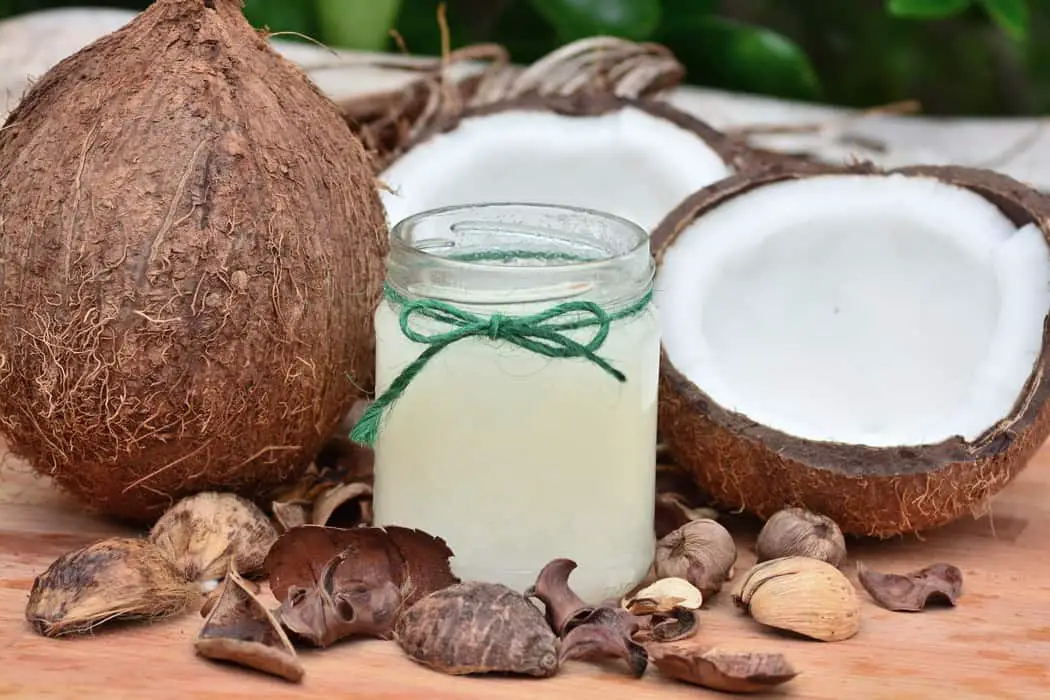Oils for cooking and baking play an essential role in hitting the desired fat macros of the keto diet.
When switching to keto, you’ll want to start experimenting with different types of oils aside from butter that are high in omega-3 fatty acids, but still aren’t prone to causing inflammation, in order to help you get the most out of your state of ketosis.
When it comes to oils for keto, MCT and coconut oil are probably the most commonly mentioned, but because they’re not traditionally used in cooking, there’s a lot of mystery surrounding them to the general public.
That’s why I decided to sit down and do a deep dive on each of these oils, to help provide a better understanding of their strengths and weaknesses, and which should be used more often for a successful keto diet.
What Is MCT Oil?
MCT Oil is a dietary supplement made from MCT fats (medium-chain triglyceride) that is often added to smoothies, bulletproof coffee, shakes, and salad dressings on keto and low carb diets.
It has a lot of different use cases, some of the most common ones include supporting weight loss and boosting endurance for physical fitness.
Most of the fats that come from the food we eat are characterized as long-chain triglycerides, which are processed by the body differently.
With MCT oil, the fats are processed right away, and are transported straight from the stomach, through the digestive tract to the liver. Once in the liver, they are converted into ketones, and used as an energy source to help our bodies stay active and burn fat.
At a caloric level, MCT oil also comes in lower than general types of fats that you’d get from foods like cheese, creams, and avocados. Typical fat from long-chain triglyceride foods contain about 9 calories per gram, whereas MCTs only contain about 8.3 calories per gram.
Because the calories that come with MCT oil are utilized very quickly after being consumed, the calories don’t turn into excess body fat. This principle of using ketones via healthy fats to lose weight is one of the cornerstones of the ketogenic diet.
In its purest form, 100% MCT oil is actually derived from coconuts, but is much more concentrated than that of coconut oil.
To sum it all up, MCT oils help your body create energy much faster than it would from fats from food. But like any dietary supplement, there are still pros and cons. I’ll get into those a little later in this article.
What Is Coconut Oil?
Coconut oil is not MCT oil, and even though MCT oil is derived from coconuts, it also isn’t characterized as coconut oil.
Coconut oil is it’s own thing, and it has a lot of great uses for the keto diet. It’s characterized as the oil that is extracted from the edible part of a coconut, and can be created as refined or unrefined.
It’s heat stable, and at room temperature is a solid, so it’s great for baking, and can be used to grease up pans because it melts fairly easily.
Coconut oil is widely used on the keto diet as a way to help hit macro counts, and for all of its great nutritional benefits (we’ll get into those details later in this post). Unlike soybean, vegetable and olive oil, coconut oil doesn’t cause inflammation in the body, which is another reason those on strict diets prefer it.
Since it’s become popularized across keto and low carb diets, coconut oil has caught some flack within the health community. Because it’s technically a ‘saturated fat’, it has been linked to increasing poor levels of cholesterol.
However the science backing these claims is old, requires more peer review and testing and has generally been called into question by most doctors and nutritionists. After all, saturated fats are found within every type of mammal, and trans fats are the true dangers to the modern American diet. Most experts agree that it’s okay to have coconut oil on a ketogenic diet, but feel free to consult with your doctor first before adding it to your daily regimen.
What’s the Difference Between MCT Oil and Coconut Oil?

While MCT oil is technically derived from coconuts, the two types of oils are fairly different when it comes to benefits, side effects, and how exactly they can be used on a keto diet.
The biggest differences appear at their respective molecular breakdowns. Coconut oil is made up of approximately 50% lauric acid, which is not an MCT, but rather a long-chain fatty acid (well technically it’s a medium length long-chain fatty acid, but I won’t get too scientific here).
So coconut oil is technically a hybrid of both LCTs and MCTs, which means it’s absorbed by the body in a different way compared to MCT oil.
MCT oil still contains some amounts of lauric acid, but not by a majority, as it also has caproic acid, caprylic acid, and capric acid in varying amounts.
The biggest differences between using MCT oil and coconut oil are that coconut oil is heat stable and has more natural nutrients, whereas MCT oil is more efficient when being turned into energy by our bodies.
However one thing to keep in mind is that MCT oil will always come as a manufactured, processed product, whereas coconut oil, even when refined or unrefined, is just more natural. Each of these come with thei own sets of benefits and drawbacks, which I’ll lay out in more detail next.
Benefits of MCT Oil
-
Increases ketone production
The rapid formation of ketones that are produced when the body processes MCT oil are great for regular bodies, especially those that are adapting or fully adapted to the keto diet.
The two main energy sources for the body are either glucose or ketones, and when your body is in ketosis, it is burning primarily ketones, which is a great way to burn fat as well. Ketones are naturally produced by the body when we enter a state of ketosis from a low carb diet, but they can also be generated through consuming MCT oil.
Ketones are a preferred fuel for both the body and the brain, because they feed all of the cells within the body. As regulatory proteins, they are an effective way to give us bursts of energy and mental clarity, much better than bursts from blood sugar spikes, which level out and dip fairly quicker after digestion.
-
Contains powerful fatty acids that promote heart health
A recent study reported that consuming MCTs is one effective way to help prevent the onset of metabolic syndrome, which refers to a collection of different heart related health problems such as high blood pressure abdominal obesity, dyslipidemia, high triglyceride levels, high cholesterol, and impaired fasting glucose levels.
MCTs are generally known to decrease the overall risk of developing heart disease, and have been found to help fight off contributing factors to the onset of obesity as well.
Part of these positive effects stems from its anti-inflammatory properties, which makes MCT oil particularly helpful to all of the body’s internal organs.
-
May reduce bad cholesterol levels
MCT oil may also play a role in contributing to the protection heart health by lowering levels of bad cholesterol.
A recent study recorded that 40 women found that consuming MCT oil in large quantities reduced bad types of cholesterol and improved levels of good cholesterol. The controlled comparison that was used in this experiment was soybean oil, and both test groups consumed these oils alongside a calorie-controlled diet.
-
Can help control blood sugar levels
MCT oil consumption has been linked to benefits for controlling blood sugar levels, which can be great for both diabetics and keto dieters alike.
One recent study discovered that when 10 people who were struggling with diabetes were injected with insulin, they required 30% less sugar in order to maintain standard resting blood sugar levels when they consumed MCT oils regularly, compared to a group that was consuming LCTs instead.
Another study out of China discovered that those among diabetics who consumed MCT oil daily saw a significant reduction in body weight, waist circumference and insulin resistance, compared to those who were just consuming corn oil high in LCTs.
-
Instant source of energy
MCT oil is generally referred to as a super fuel in the nutrition world, because your body absorbs MCTs much more rapidly than long-chain triglycerides (LCTs).
Because of their shorter chain length, MCTs are able to go straight from the gut to the liver and do not need any stomach bile in order to break down like other long chain fatty acids do. This means the body is able to get an instant burst of energy, without the crashes like you’d see from a sugar rush.
The ketones that are generated in your liver from MCT processing are also able to pass through your blood-brain barrier, which makes them an extremely efficient source of energy for your brain cells.
-
Could help manage epilepsy
What comes as a surprise to most people, is that one of the first use cases of the ketogenic diet wasn’t for weight loss, but rather for epilepsy symptom management.
Scientists have discovered that fasting while on a keto diet rapidly increases ketone production, which has been linked to a reduction in the frequency of epileptic seizures.
The same benefits from rapidly increased ketone production can come from consuming MCT oil.
If you’re a person struggling with epilepsy, you should talk to your doctor before considering utilizing a ketogenic diet and MCT oil as potential treatment options.
-
May support cognitive health
MCT oil has not only been found to help feed your brain cells, but has also been found to improve the overall state of your gut health — which is significantly connected to your cognitive functioning thanks via the “gut-brain connection.”
Bacterial gut health is vital for not only our digestion, but also our cognitive processes such as critical thinking, memory, mental clarity, and even mood regulation – all of which have seen improvement when incorporating MCT oil into a ketogenic diet.
-
Promotes weight loss
Of course one of the most popular reasons that people flock to MCT oil is the promoted weight loss that tends to come with it. It contributes to weight loss in the same way that intermittent fasting contributes to it, in that the rapid increased production of ketones also helps contribute to burning off body fat and increasing the rate at which we lose excess bodyweight.
Additionally, MCT oil has about 10% fewer calories than long-chain triglycerides (LCTs), making it a beneficial add-in to most dishes and drinks as a way to boost ketone production and keep you under your daily caloric limits.
Side Effects of MCT Oil

-
Could lead to fat build up in liver
Consuming high amounts of MCT oils have been linked to an increase the amount of fat within your liver in the long term. While eating a diet high in fat is generally encouraged for the keto diet, fat staying within your liver for extended periods of time does carry some potential risks for liver and bladder damage.
However generally the studies that have found this were for those who were consuming for greater than the daily recommended doses of MCT oils anyway, so as long as it is consumed in moderation, this long term issue shouldn’t be something to worry about when incorporating MCT into your keto diet.
-
Could trigger hunger responses when consumed in high quantities
While the consumption of MCT oils has been linked to a potential increase in the release release of hormones that work to help you be able to feel fuller for longer periods of time, they may also actually provide extra stimulation in the release of hunger hormones like ghrelin in some types of people.
In a recent study, people who consumed more than 6 grams of MCT oils per day ended up producing more of these hunger-triggering types of hormones than those who only had less than 1 gram of MCT oil per day.
-
Can cause intestinal problems
Many people have reported that when they consume too much MCT oil all at once, especially when first adapting to them as a new part of a ketogenic diet, tend to find that it upsets the stomach and intestines, resulting cramping, diarrhea, and other symptoms similar to irritable bowel syndrome (IBS).
MCTs have also been known to cause nausea in people who aren’t particularly fat adapted yet, so you may want to spend some time getting used to the keto diet first before going all in on MCT oils. Coconut oil I’ve found is a good way to ease your body into the digestion of high saturated fat content oils.
-
Not heat stable – cannot be cooked
Generally I’d advise against cooking MCT oil. It doesn’t tend to be heat stable compared to other oils like coconut oil, and is much better for shakes, iced coffees, and salad dressings.
There are different kinds of MCT oils that have been fortified for baking, but they tend to be harder to come by. A good rule of thumb I stick to is coconut oil for cooking and baking, MCT for anything room temperature, frozen, or chilled (like for making fat bombs!).
-
Expensive
MCT oil is pretty expensive, and even though a little does go a long way, it’s not the best for beginning keto dieters who are still trying to adapt to a new grocery shopping and supplement routine without breaking the bank.
I tried to incorporate MCT oil way too early into my keto journey when I was starting out and I definitely didn’t need to. I like to use it occasionally now, but I could’ve saved a lot more money while my body was still getting fat adapted.
That being said, there are some great brands of MCT oil that I enjoy, that aren’t overwhelmingly expensive, which I’ve included later in this article.
Benefits of Coconut Oil
-
Good source of healthy fatty acids
Coconut oil is a great source of omega-3 fatty acids, which are an essential component of your recommended fat macros on a ketogenic diet.
It’s also been proven to make these fatty acids twice as effective, as when they are in an oil, they are more readily available and easily digested by the body to start providing benefits immediately from within the gut.
Omega-3’s themselves have an array of science-backed benefits, including fighting off depression and anxiety, as well as improving one’s vision, brain health, and child development when taken during pregnancy.
-
Can increase fat burning
Consumption of coconut oil, like consumption of MCT oil, has been linked to an increase in fat burning, especially when used in conjunction with a low carb diet.
Despite being high in calories, the saturated fat elements of coconut oil help to kickstart the body’s metabolism and burn fat at a much faster rate than eating the same amount of calories from other oils like vegetable oil or olive oil.
The medium-chain triglycerides (MCTs) that are found within coconut oil can directly increase how many calories you burn.
One recent study found that consuming 15-30 grams of MCTs per day via coconut oil was able to increase 24 hour energy expenditure by 5%, resulting in about 120 calories per day of naturally burned calories.
-
Can reduce hunger
Another big reason keto dieters flock to coconut oil, is because it and other foods high in omega-3 fatty acids have potential to reduce your hunger and cravings.
In one recent study, different amounts of medium and long chain triglycerides were fed to 6 healthy men.
Among the men who were consuming the most MCTs, they all ended up eating 256 fewer calories per day than those eating predominantly LCTs.
Another study in 14 healthy men found out that that those who ate the most MCTs at breakfast time in particular also ate fewer calories at lunch time, especially compared to those who didn’t consume any extra fats or those who consumed more LCTs.
-
Can protect your skin and hair
Even though it’s generally used to be eaten on the keto diet, coconut oil actually has a variety of uses that go beyond just digesting it.
Many people are regularly using it for cosmetic purposes, namely to improve the overall health, quality, and appearance of their hair and skin.
Recent studies that were conducted on people with dry skin displayed results that coconut oil actually had an impact on improving the moisture content of the skin.
It has also been connected to a reduction in symptoms of eczema.
-
Can help you burn abdominal (visceral) fat
Along with being able to help curb hunger cravings and increase fat burning, it’s only fitting that coconut oil is also very helpful when it comes to losing weight.
Abdominal, or visceral fat, is a kind that is generally very hard to lose, and is particularly dangerous, because of its proximity on the body to various vital organs.
In a recent study of 40 women who were all struggling with abdominal obesity, it was found that supplementing with 2 tablespoons of coconut oil per day ended up leading to a significant reduction in both BMI and waist circumference over a time frame of about three months.
Side Effects of Coconut Oil
-
Fats in coconut oil can raise LDL cholesterol
While it is a bit contentious within the health community, increased consumption of coconut oil has been linked to some marginal increases in bad, or LDL cholesterol levels.
This relationship isn’t entirely sound, as the medical community is somewhat still split on this connection.
However if you do have high cholesterol levels, you should consult with your doctor before deciding to incorporate coconut oil as a major part of your new diet.
-
May cause allergies
While not as frequently experienced as other types of allergies, coconut oil can have the ability to cause allergies if one is particularly sensitive to coconuts.
Some of common allergic reactions to coconuts and coconut oil often include nausea, eczema, vomiting, hives and rashes, vomiting, and anaphylaxis (a lethal emergency that involves trouble breathing after being exposed to an allergen).
If you think you may have a coconut allergy, you should consult with your doctor before incorporating it into a ketogenic diet.
-
Can cause acne
Experiencing acne from consuming coconut oil is rare, and is more likely to take place in people that already have naturally oily skin.
The lauric acid that makes up roughly 50% of coconut oil typically assists in eliminating any present acne-causing bacteria, however it isn’t perfect, and everyone’s bodies tend to react differently to lauric acid.
-
Has been linked to cases of intestinal distress
Like MCT oil, coconut oil has also been connected to intestinal problems unfortunately. People who struggle with a conditio known as fructose malabsorption are especially susceptible to these side effects.
A variety of food products that use coconut oil as a base also contain fructans, which are made up out of a small chain of fructose. Fructans have been known to also cause gastrointestinal problems on their own.
Other compounds like sulphites are present in desiccated coconut and coconut oil, which have also been known to exacerbate digestive issues.
Which is best for a keto diet?
Ultimately, you don’t actually have to choose between one or the other when it comes to MCT oil and coconut oil.
But if I had to make a choice, I’d have to go with coconut oil every single time. As a natural product, it’s just a lot easier to digest by our bodies, and is relatively inexpensive compared to MCT.
That’s not to say that the benefits of MCT oils are worth ignoring – they definitely have a safe place within the realm of keto diet supplements.
The real benefits boil down to coconut oils’ lauric acid content, omega-3 fatty acid content, and its own content as a natural MCT. It really can provide the most benefits for the least amount of money spent between the two.
However, as I mentioned above, I still use both in different circumstances in the kitchen, and have some brands of both coconut and MCT oil that I definitely prefer to others.
My top MCT oil brands include:
The coconut oil brands that I personally use most and would recommend most include:
- Nutiva Organic, cold-pressed, unrefined coconut oil
- Carrington Farms unrefined coconut oil
- Kirkland Organic Coconut Oil


